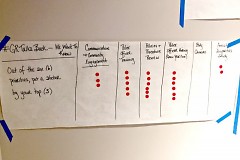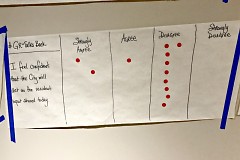On Monday June 12 at 12 p.m., the first of a series of Community Listening meetings on policing, hosted by the City Commission, took place at the Michigan First Credit Union on Breton and Burton. Attendees were directed to the basement room and invited to sit in one of three discussion groups. Three facilitators explained that during this meeting the city leaders were present but were not going to be talking - they would be listening instead.
Stacy Stout, Assistant to the City Manager, spoke on the progress of the 12-point plan for community and police relations. She mentioned that officers had been wearing body cams for about a year, and that they participate in community programs like coaching baseball. She said that the city's website is being re-designed to be easier to navigate and that community engagement is important to the City Commission. Stout said the SAFE task force and the commission were considering neighborhood programs like Cure Violence and ShotSpotter to help reduce violence in a holistic way. She also mentioned that the Commission is voting this week on setting aside $1 million a year for the next 5 years for community and police relations.
After presenting this information, the small group discussions began. Focusing on six areas that started at "community engagement," included "policies and procedures" and ended at "arrest disparities," the groups were asked to comment on questions like "Are we going in the right direction?" "What are we missing?" and "What are we not hearing?" Recognizing that time was limited, the facilitators encouraged people to write their further comments on sticky notes and leave them on the presentation board that displayed the appropriate issue.
Comments varied widely. Some felt that there was already enough community engagement. They were concerned that the conversation and questions showed a lack of trust in police. Others felt that the conversations were not meant to criticize the police, but to focus on systemic problems that data showed had a larger impact on communities of color. Russell Olmsted, an attendee and member of the Community Police Relations Council, suggested that each ward hold meetings with their Commissioner to more deeply discuss these issues. Still others felt that even these conversations weren't getting to the core questions that need to be discussed.
Peter Tewinkle, who attended the meeting, said, "I appreciate the idea of listening to the community, but we seemed to be missing the main point during the talk back. I think we need to be talking more about the community's expectations around the act of policing itself. How can we ensure that everyone feels protected by those who serve us?" Tewinkle concluded, "We can address the other six points after we answer that."
The Rapidian, a program of the 501(c)3 nonprofit Community Media Center, relies on the community’s support to help cover the cost of training reporters and publishing content.
We need your help.
If each of our readers and content creators who values this community platform help support its creation and maintenance, The Rapidian can continue to educate and facilitate a conversation around issues for years to come.
Please support The Rapidian and make a contribution today.



